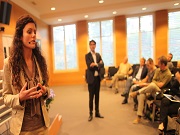News
Does greater security have to mean less freedom?

Does greater security automatically entail a loss of freedom? Do we need more surveillance cameras in our streets? More police on patrol? Do the media and social networks increase a feeling of insecurity?
These are the themes that were on the programme of the fourth edition of “What Next” which took place at UNI Global Union’s headquarters in Nyon last week. The debate was co-organized with the town of Nyon and the magazine, Bilan.
During the event, chaired by the RTS journalist, Olivier Dominik and the editor-in-chief of Bilan magazine, Stéphane Benoit Godet, the organizers published the results of a poll conducted with residents of the Léman region by Geneva Business School.
They showed that even if a majority of those questioned felt that there had been a decline in public safety over the last 10 years, there was still a feeling that Geneva and Nyon were relatively safe towns. Even so, some people have changed their daily habits: not walking alone at night or even avoiding certain areas altogether. The poll also revealed that people want to maintain their freedom to go where they like, while doubt was cast on the use of surveillance cameras and their ability to reduce violent crime. Equally, several alternative solutions were brought up: redesigning public spaces to make them safer for example or strengthening mediation teams to nip trouble in the bud.
In his opening remarks to the debate, Pierre Maudet, the councillor responsible for security in Geneva recognized the public perception that security levels had declined but said that a measure of common sense was required to confront crime as well as a strong sense of community. For Mr Maudet there was no need to make a choice between freedom and public safety.
He underlined that security and freedom were not diametrically opposed. In order to increase security it was necessary to reduce insecurity and reinforce individual freedom at the same time by for example, fighting against homophobia, better integrating immigrants or ensuring the protection of online personal data.
For the Secretary General of UNI Global Union, Philip Jennings, the debate needed to be widened. He said that UNI believed in a broader definition of human security covering economic wellbeing, political freedom, access to healthcare, food security, decent sanitation, environmental protection, a strong community and, of course, personal safety.
A sense of perspective was required, he continued. Nyon was not New York in the 1970s, nor Colombia where 2,500 trade unionists have been murdered – considered as legitimate targets.
Martin Killias, of St Gallen’s Institute of Criminology, Jean Zermatten of the Institute for Children’s Rights, Elisabeth Ruey-Ray, the elected official in charge of security in Nyon and Olivier Guéniat, a police commander in the Jura also took part in the debate.
Mrs Ruey Ray mentioned anti-social behaviour as a contributing factor to public insecurity, while Mr Killias called on the cantons to better cooperate in fighting criminality. For Olivier Guéniat too there was a lack of coordination at the European level in dealing with questions of political asylum.
In his concluding remarks, the mayor of Nyon, Daniel Rossellat said the subject would remain important in the months and years to come but that it was important to respond in a sensible way.
We have to be intelligent, he said, we should not be afraid to discuss this subject which concerns everybody but we have to find the right balance between public safety and individual freedom.

